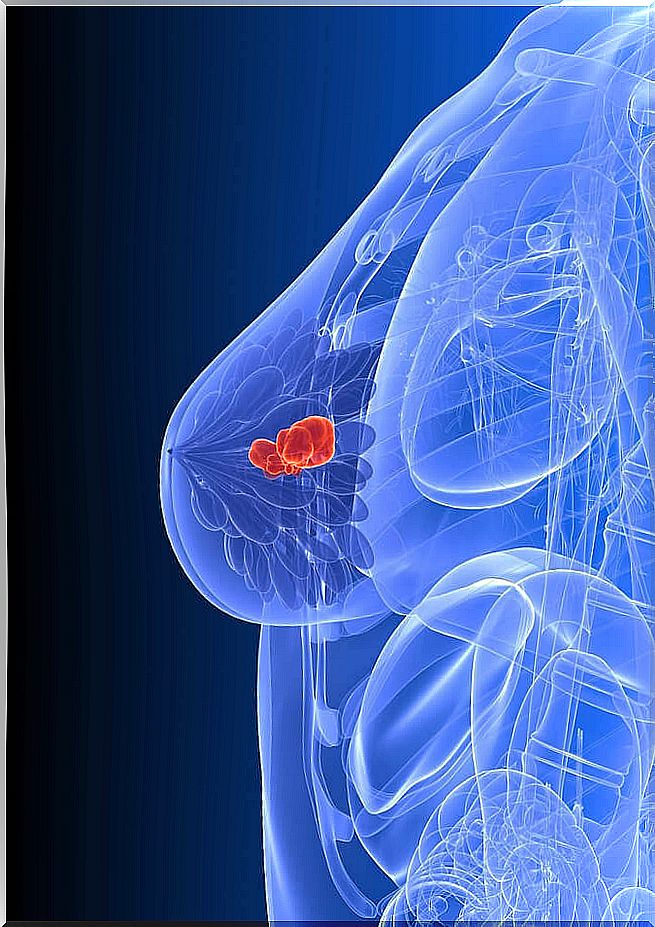Breast Cancer And The Role Of The BRCA-1 And BRCA-2 Genes
BRCA-1 and BRCA-2 are high-risk genes that are being studied to determine the severity of breast cancer. Because a mutation aggravates the clinical picture.

The BRCA-1 and BRCA-2 genes produce proteins that play an important role in the inhibition of malignant cells. The proteins encoded by these two genes repair the damaged ADN and have the task of guaranteeing the stability of the genetic material in every cell.
Like every gene, the genes mentioned can also have mutations that change their structure and deactivate them. If this is the case, the repair function of the relevant proteins is damaged and the DNA cannot be corrected.
As a result, the likelihood of genetic changes that can lead to cancer is far greater. The mutation of these two genes specifically means an increased risk of breast and ovarian cancer.
Triple negative breast cancer and the genes BRCA-1 and BRCA-2
The lack of expression of the estrogen and progesterone receptors and the lack of overexpression / amplification of HER2 / neu are characteristic of triple negative breast cancer.
It is a high-risk disease with a complicated prognosis because the therapeutic methods of treatment for this type of cancer are very limited. The therapy of choice is usually chemotherapy, as there are no specific treatments yet.
Triple-negative breast cancer represents around 12 to 17 percent of all annual breast cancer diagnoses. The risk of spread and metastasis is particularly great with this disease. Because of this, and also because there is no specific treatment, the prognosis is usually poor.
Often this type of tumor has an impairment of the BRCA protein function. Over 80 percent of women with an inherited mutation in the BRCA-1 gene who suffer from breast cancer have triple negative breast cancer.
In addition, an estimated 15 percent of patients with ovarian cancer and 5 percent of patients with breast cancer, pancreatic cancer, or prostate cancer have an inherited mutation in the BRCA-1 or BRCA-2 genes.

Treatment of triple negative breast cancer with a mutation in the BRCA-1 and BRCA-2 genes
In December 2014, the application for the commercialization of the drug olaparib as a sole treatment for advanced ovarian cancer due to the aforementioned gene mutation was approved. The efficacy of this drug in treating advanced breast cancer in previously treated patients with a mutation in the BRCA-1 and BRCA-2 genes was then assessed.
When using the tolerated dose of olaparib, which is set at 400 mg every 12 hours in capsule form, the expected response was observed in 54 percent of patients with triple negative breast cancer. This promising result means that 7 out of 13 patients responded positively.
Other factors that affect BRCA protein function
In addition to the gene mutations mentioned , other factors can affect normal BRCA protein function. For example, the methylation of these genes, i.e. the chemical change of the basic building blocks through the enzymatic transfer of methyl groups (-CH3) to the promoters of the genes.
A promoter is a nucleotide sequence on the DNA that enables the regulated expression of a gene. It is therefore the DNA sequence that arranges the formation of a certain type of protein by the RNA.
If the genes mentioned are methylated, they cannot synthesize the proteins required to inhibit tumor cells. The methylation of the promoter of the BRCA-1 and BRCA-2 genes has been observed in various neoplasms:
- Ovarian cancer: 5 to 20 percent of the time
- Tumors in the digestive tract: 50 percent of the time
- Breast cancer: 29 to 59 percent of the time

Final remark
The genes BRCA-1 and BRCA-2 play an important role in breast cancer. A high percentage of patients with a mutation or methylation of these genes suffer from triple negative breast cancer. The prognosis is complicated because treatment options are still very limited.
Research in this area is fundamental in order to develop new therapeutic treatments that will help in the fight against this disease. Research into genetics gives many hope of having successful treatments to choose from in the future.









